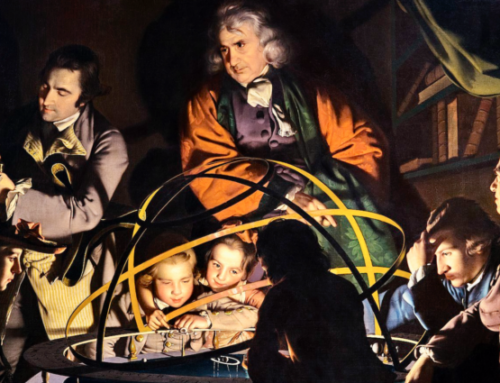Modern philosophy, empirical science, and our social sciences stand mute before moral questions and the human spirit. Let us, therefore, turn to the Ancients for their understanding of alcohol’s effects upon the soul.
 “What’s this chemical ferment called life all about? I shall be impelled to strong drink if something exciting doesn’t happen along pretty soon.” —Jack London
“What’s this chemical ferment called life all about? I shall be impelled to strong drink if something exciting doesn’t happen along pretty soon.” —Jack London
Many of us find the occasional drink to be a palliative to the modern pace of life. Things seem to slow down over a pint of beer. We have also been informed about the health benefits of moderate wine drinking. Problems arise with alcohol, as with many things in life, not with its use but with its abuse. Alcohol’s alluring properties, addictive for some drinkers, place it in a class of things with powers and properties that need to be recognized and respected. Though recent research and therapeutic techniques have addressed alcoholism with success, people continued, and will continue, to abuse alcohol. What follows here is not offered as a panacea, but an alternative understanding of alcohol abuse within the context of a pre-modern understanding of how human life ought to be lived. The reader is asked to set aside, for the moment, our shared modern prejudice that our knowledge today is far superior to that of the ancients, that we know more than they ever could, and that they, therefore, no longer meaningfully speak to us about how life ought to be lived.
The line between the use and abuse of alcohol is often ambiguous or drawn differently for different people. Were one to discover a personal susceptibility to addiction, then for both prudential and ethical reasons one should avoid drinking alcohol. The modern response to addiction, largely informed by experimental science and behavioral psychology, tends to elevate important prudential reasons of mental and physical health at the expense of ethical reasons. We retrieve the ethical reasons by going back to an earlier understanding of things, that of the classical philosophy of Plato and Aristotle.
It would be foolish to discount the conclusions of modern health science regarding alcoholism. Science speaks to us powerfully. Our world continues to be shaped by the presumptions of morally neutral science and technology. But we should not let science speak to us so loudly and singularly that we hear no other voice.
Medical science sees alcoholism as a disease nearly fully reducible to genetic or psychological causes. But it is not simply this. Though genetic and psychological reasons for alcoholism have been established, the human will, despite powerful cravings, is able to interpose itself between desire and consumption. This volitional counterpoise of the will, rationally guided, creates an interstice between stimulus and response, appetite and act. Within this gap lives ethics. This dimension is elusive for modern science. However valid the conclusions of science are in explaining empirically verifiable facts, science stands mute before moral questions and the human spirit. Our social sciences, too, handle moral judgments with clumsy fingers. Were all of our actions reducible to value-free facts and predetermined conditions, then our very humanity would be lessened. Human beings would then merely behave. Action, noble or base but free, would be illusory. The will would then be, as Thomas Hobbes defined it, merely the last appetite or aversion that precedes the choice to do or forbear. Without free will ethics is either impossible or reduced to a subjectivism where appetite and aversion alone determine good and evil.
Following Plato, I shall use the “soul” to designate that conscious part of human nature capable of thinking. Referred to variously as “spirit,” “intellect,” “consciousness,” “soul,” or “nous,” Plato holds this part of our humanity to be irreducible to material or bodily causes, a claim typically denied by modern science. I shall also use “spiritual” or “soul” here, not in its exalted or religious sense, but to designate the human capacity for freedom and dignity. Given the existence of such a spiritual or conscious component of our being, alcoholism may well be a disease, but it would be a disease for which we are responsible, a spiritual disease of a disordered soul. To understand this disorder requires understanding the proper ordering of the competing elements of the human constitution. Modern philosophy is reluctant, and empirical science is unable, to admit the reality of the human spirit as a fit subject for serious investigation.
The ancient Greeks enjoyed the fruits of their vines. Some of them also exhibited acute and exquisite genius in poetry, art, history, and nascent science. Other Greeks brought philosophy into an unreceptive world and defended it from a hostile regnant morality grounded in tradition and superstition, closed to advances in wisdom.
Let us join a drinking party depicted by Plato in his dialogue, the Symposium, where love is praised primarily by poets and Socrates. The party begins by setting the drinking protocol regarding wine consumption. Given that many of the participants are hungover from a party the prior night, a physician relaxes the apparently typical drinking quota for such parties; the participants will be free to drink as much or as little as they please. Plato then has the speeches on love delivered under the increasing effects of drinking, until, at the end of the party, the inebriated Alcibiades barges into the scene declaring things publicly he would be too ashamed to proclaim when sober. This is precisely why Plato sets the discussion about love in the context of a drinking party. Drinking relaxes prudential and moral considerations that usually govern speech. Incautious boldness replaces reticent shame in speech and deed.
Modern psychology often portrays shame as a growth inhibiting hang-up that requires therapy so that it doesn’t unduly damage the personality. Hardly puritanical, the Greeks did not see shame in this way. For example, immoderate Achilles burns with insatiable desire to avenge Patroclus’s death at the hands of Hector. Upon learning that should he kill Hector, he himself will be doomed to imminent death, Achilles shows utter contempt for this fated end with words that are laconic and beautiful: “Let me die forthwith, rather than remain here by the beaked ships, a burden to myself and others.” Achilles fears death far less than the ignominious shame of failing to avenge the death of his comrade. How different is this from the modern psychology of, say, a Hobbes where concern for virtue is absent, and all human beings are impelled by a restless drive for power in order to ward off death at all costs. Achilles’ stance does not prove that shame is always directed to proper ends, but it does show that it can have a powerful effect in guiding our choices.
So how might a retrieval of shame apply to the use and abuse of alcohol? Another Greek virtue, moderation, comes to our assistance here. Were one to abuse alcohol to the point where reason no longer governs the will, one would be out of balance, immoderate. When drunk we are not autonomous, a Greek word meaning the self-application of the law to oneself. When we lose autonomy, we no longer govern ourselves, and this is a most serious issue. It is also shameful. A modern example of this is drunk driving. To drive drunk and to be arrested is not only punitive and expensive, it is also shameful, or at least it should be were not shame and guilt so disenfranchised by our modern quest for comfortable personhood. The ancient Greeks make us uncomfortable when they show us a nobility that hears the voice of shame.
Plato’s student Aristotle can also help us to understand the consequences of alcohol abuse with his analysis of tyranny. According to Aristotle, the tyrant is a person who tolerates no impediments to his or her will. A tyrant’s appetites and desires are uppermost, with their reason exercising a merely ministerial function. Aristotle thinks that this is serious because he defines the human being as a rational animal, where reason should rule and order our other capacities because reason is suited to do so by its nature. The passions, desires, and anger are also part of our nature, but they should not rule because they are not suited by their nature, by what they are, to do so. This view in both Plato and Aristotle is called natural right. That reason should govern the appetites is right by nature. For Aristotle, an ordered, virtuous soul leads to happiness. Opposite this stands the tyrant, fearsome and base, but in the final analysis enslaved to lower drives that have usurped the role of reason. It is this aspect of tyranny that mirrors alcoholism: a disordered soul where reason no longer governs. It is a terrible thing to be enslaved to anyone or anything. When we lose control of our drinking then we let it control us. This is to be enslaved by our appetites, a situation neither healthy nor noble. The Greek word for nobility also means “beautiful.” A disordered soul then is neither happy nor beautiful.
Plato and Aristotle were not existentialists who deny natural right. For them, morality isn’t defined as authenticity, nor are they relativists. They hold that our human nature doesn’t vary with time or from place to place. Grounding morality in human nature and human reason’s ability to discern it means that for Plato and Aristotle ethics rest upon a non-arbitrary basis. Does this mean that their ethical theories are judgmental? Yes, but Plato and Aristotle defend their stance with a rank ordering of the kinds of life to be lived or not lived. Upon this view, alcoholism should be fought because it is base. It cannot lead to a harmony of soul, virtue, or happiness. Our modern sensibilities are offended by such a severe judgment. Socrates, on the other hand, believed that a life unexamined is not worth living. Even the modern philosopher Nietzsche thought that we moderns are no longer willing to be severe with ourselves, that morality had become slavish. We no longer wish to be judgmental, even with ourselves, because it is hard.
Today, the truth about the nature of things is powerfully supported by rigorous methods, science, mathematics, and open-ended experimentation. Technology continues its advance. We are the benefactors of this progress. But it is not the whole story about the nature of things. Something is missing. We no longer have the sense that nature is a home that provides guidance for how we should live within it, that it is a cosmos. Cosmos is a Greek word meaning both order and a beautiful jewel. The cosmos is the home of man within which we can live beautifully because it is a home that comes with house rules, natural right, that provide guidance for how we ought to live. Absent a sense of cosmos, we obey biochemical “laws,” but do so without a sense of moral guidance, as when two galaxies or atoms collide without purpose, following mathematical laws of physics. Science understands human nature in the same value-free, objective way that it understands the nonhuman. We should be grateful to it. It has cured diseases and put us on the moon. But whatever science provides or understands it understands without a moral sensibility.
Alcoholism has causes and effects, and we should not abuse alcohol for reasons of physical and psychological health. But there may be other reasons as well. We are not simply prisoners of such causality and determinism. We can consult the facts of our nature for moral guidance. This is to derive a value from a fact, an operation denied by modern science and much of modern philosophy. Morality today has been largely reduced to a matter of personal preferences unrelated by any overarching basis in human nature. Concepts of the soul or the human spirit are out of fashion even in moral debates. We have become subjected to predetermined conditions or forces arrayed in a nature mute as to how we ought to live our lives. Nature has been mathematized and manipulated by technology, offering little guidance as to how we ought to live in order to be happy. We become sad, or unfulfilled… technology offers a pill for that. Our humanity is dislodged in the very world that was supposed to set us free. Hence, we drink alcohol. The ancients, who also drank, inform us about a qualitatively different human happiness, one that teaches us to be responsible for the order and disorder of our souls. This is the ethical task of the art—not science—of living.
Today we are understood, not as acting, but as behaving. If one is genetically, biochemically, or socioeconomically predisposed to alcoholism, then one is not responsible for it. Without free will and responsibility, ethics becomes meaningless. For Plato and Aristotle human beings do not merely behave. We have the capacity for action, noble and base. Happiness is at stake here. We should be women and men who govern ourselves using our reason. When we drink alcohol let us be moderate, let us be aware of the health risks of alcohol abuse. But let us also be aware that alcoholism is a spiritual disease of a disordered soul. Despite their limitations, the ancients speak to us powerfully about happiness and how we ought to live. This older view gives us reasons for governing our use of alcohol as well as our lives. Virtue and happiness are in our hands. It is better to fail nobly than to succeed basely. One must look to the justice of one’s cause and of one’s soul.
In conclusion… I would like a cold draft beer. But because this prospect is so inviting, and would be so easy to fulfill, I think I shall forego it.
The Imaginative Conservative applies the principle of appreciation to the discussion of culture and politics—we approach dialogue with magnanimity rather than with mere civility. Will you help us remain a refreshing oasis in the increasingly contentious arena of modern discourse? Please consider donating now.
The featured image is courtesy of Pixabay.







Leave A Comment